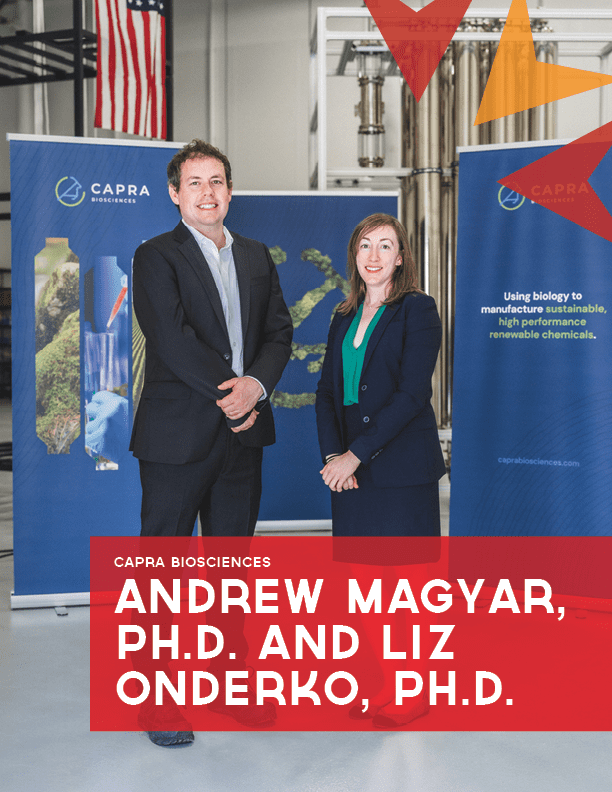Capra Biosciences Revolutionizes Chemical Production With Patented Modular Bioreactor Technology
Capra Biosciences is revolutionizing chemical production through cutting-edge technology. Andrew Magyar, Ph.D. and Liz Onderko, Ph.D. developed patented modular bioreactor technology that can provide a rapid response platform for pharmaceutical shortages in the United States and worldwide. The technology creates bio-based chemicals that are both affordable and environmentally friendly.
“Andrew and I met about five years ago at our previous jobs. We ended up collaborating on the core technology for the company, which is this modular bioreactor technology. In my previous role, I focused on using synthetic biology at the Naval Research Lab in DC. Andrew was working at the non-profit Draper, focused on the instrumentation that allowed biology to accomplish amazing things, and the combination of our roles created this idea,” said Dr. Onderko.
The idea was to create the first bio-based chemicals that transform byproducts and waste into valuable materials for humanity during the production process. The technology would not only streamline the process of creating vital chemicals for pharmaceuticals but also make a positive impact.
“In our former roles, we looked at biomanufacturing from different perspectives. The group Liz was working with at the Naval Research Lab was researching how biomanufacturing can solve Department of Defense problems. At Draper, we were thinking about it from a national defense perspective, but also this bigger picture of the challenges in biotechnology that need to be solved,” said Dr. Magyar. “When we met, we were excited about this technology that Liz had been working on because it had this unique potential to transform biomanufacturing.”
According to Dr. Magyar, researchers have been trying to make chemicals cost-effectively for years in the biomanufacturing space. Large-scale industrial bioreactors are typically based on equipment developed for the brewing and ethanol industries, but the focus needed to be shifted to developing a more innovative and sustainable process for a broader range of chemicals. “Almost all chemicals we make using biology today are in these giant tanks– the same way you brew beer. For many necessary chemicals, it just doesn’t make sense to make them that way. We focused on advancing hardware technology for making bio-based products, which was something that had been lost in the cracks. People were so focused on the biology aspect, they forgot about improving the hardware that you needed to help the biology do its job,” said Dr. Magyar.
The name “Capra Biosciences” also has a unique creation story. “An exciting thing about our technology is that the microbes we use can have a lot of different types of carbon sources. They can essentially feed on a wide variety of food, which is important because we’re surrounded by all these agricultural byproducts and food waste. You can take those and feed them to the microbes. Our company’s vision is to focus on those underutilized feedstocks and use them to make chemicals. This connects to our name because Andrew had shared with me how they use goats up in the Boston area to eat poison ivy, and this led to a joke about how goats are the ultimate bioreactor,” said Dr. Onderko. “They take low-cost, unwanted feedstocks and transform them into higher-value products like goat cheese. Capra is Latin for goat.”
Capra Biosciences began as a startup in nearby Prince William County, Virginia. The team worked within the Prince William Science Accelerator, an 11,214-square-foot facility that houses nine wet laboratory spaces. “We are grateful for our beginning in Prince William County; their Science Accelerator is a valuable regional asset. In the biotech space, counties work closely, making our transition to Loudoun County seamless,” said Dr. Magyar.
The Capra Biosciences team moved to Loudoun County because of its strong agricultural base and prime location within the tech sector. Capra Biosciences is using the agricultural byproducts available in Loudoun County and transforming them into higher-value bioreactor technology . “Being in this environment is great for our mission. It’s an exciting, growing location with much new development and solid public transportation. It is a convenient hub for our investors,” said Dr. Magyar. “We are meeting with one of our biggest investors today, flying in from San Francisco. They’re coming directly here because we are only five minutes from Dulles International Airport. They’re bringing another potential investor with them from Europe. It’s easy for us to be a showcase with such a central location. We also recently hosted the Assistant Secretary of Preparedness and Response. It’s convenient for people in the government to visit facilities somewhere like Loudoun County.”
Capra Biosciences was recently awarded a $7.5 million, two-year project agreement through the BioMaP-Consortium and plans to use the investment to address pharmaceutical ingredient shortages in the United States. Many active pharmaceutical ingredients are made overseas, not in the United States, which poses supply chain and security challenges. These are often essential medicines. “By having programs like this, we can on-shore active pharmaceutical ingredient manufacturing,” said Dr. Magyar. “Another layer of our mission is that we want to make these ingredients using biology. Traditionally, these chemical syntheses have been environmentally damaging and are not necessarily something that you would want in your backyard. By using our biology-focused technology, these products can be made more sustainably and locally.”
The technology Capra Biosciences uses is a modular reactor design that is used to demonstrate how three specific, commonly used pharmaceutical ingredients can be scaled to a larger population. In a crisis where these pharmaceuticals need to be scaled up in production quickly, Capra Biosciences will know how to accomplish that effectively. “The main focus of this project is demonstrating the feasibility of a rapid response platform,” said Dr. Magyar.
Capra Biosciences believes its team of young, diverse professionals has been a catalyst to its success. “The level of energy and excitement that a younger team brings is amazing. It’s helpful for a startup where we’re developing new technology that people aren’t held back by limitations that they think are in place, but might not be there,” said Dr. Magyar. Capra Biosciences employees are sourced through local internship programs and nearby, nationally-renowned George Mason University.
“We also participated in a really valuable STEM2VA internship program. Two of our full-time hires are people who originally interned for us through this program. It had a 50/50 match to help pay interns, but that wasn’t even the biggest benefit. This program allowed companies to find interns in a portal from multiple educational facilities and companies that interact together,” said Dr. Magyar. “It allowed us to source interns that were interested in what we were doing and had related background experience.”
The team also credits Loudoun Economic Development with an easy permitting process and quick growth from incubator status to where they are today. “Loudoun Economic Development has been amazing in helping us navigate the permitting process. They have essentially handheld us through how to get our building permits. Our build-out process would have taken far longer without their support. They’ve been phenomenal,” said Dr. Magyar.
While traditional bioreactor design originated in beer brewing, Capra Biosciences has essentially redesigned it with efficiency and sustainability in mind. The minds behind the new developments, Dr. Magyar and Dr. Onderko, hope that their new technology will continue to be the first of its kind– delivering affordable, environmentally friendly chemicals in record time and scale.
Publisher: Source link











